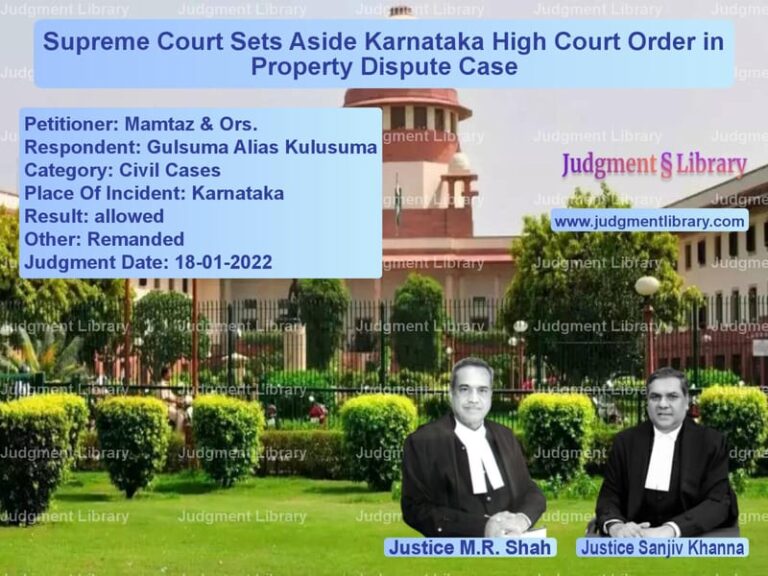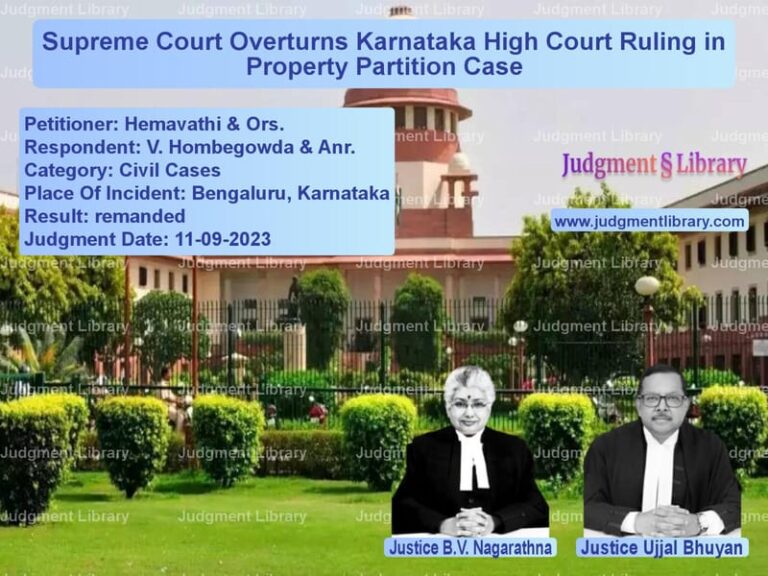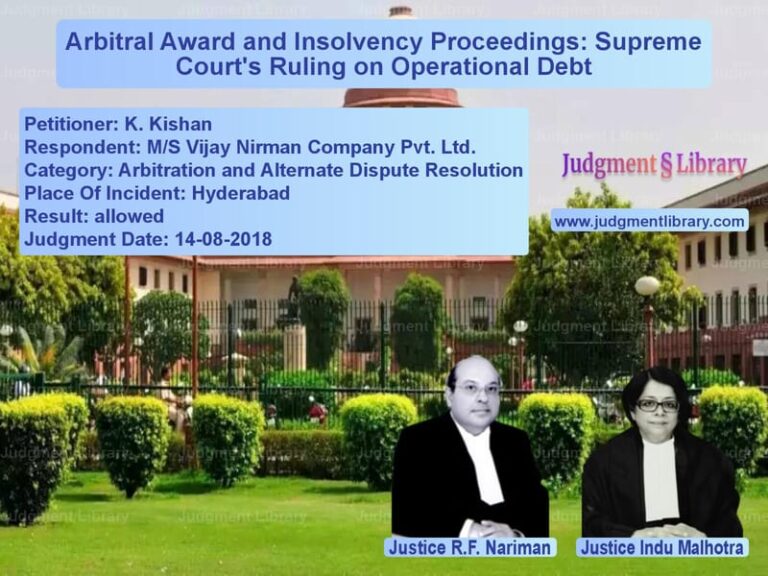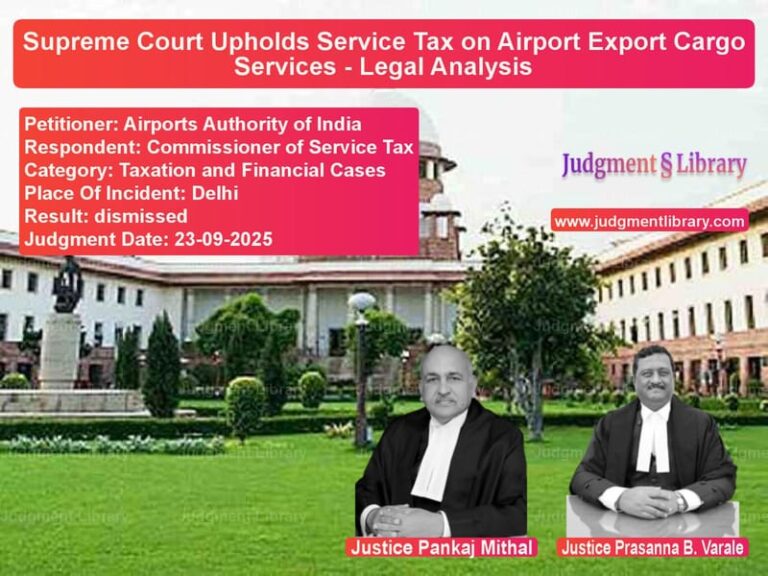Supreme Court Upholds Land Reservation for Development Plan
The case of Mohandas and Others vs. The State of Maharashtra and Others revolves around the reservation of land for public purposes under the Maharashtra Regional and Town Planning Act, 1966. The Supreme Court upheld the reservation of land for a shopping complex and vegetable market in Gondia, dismissing the landowners’ plea to quash the reservation.
Background of the Case
- The appellants, Mohandas and Others, owned land in Gondia that had been reserved for a shopping complex under the Development Plan notified in 1984.
- They purchased the land on January 2, 2006, knowing that it was subject to reservation.
- The Maharashtra government had failed to acquire the land within ten years of the Development Plan’s publication.
- The appellants’ predecessors had served a notice under Section 127 of the Maharashtra Regional and Town Planning (MRTP) Act in 2004, demanding the acquisition of the land.
- However, a declaration under Section 126(4) of the Act was issued in 1992, preventing the lapse of reservation.
- In 2012, a revised Development Plan was published, reaffirming the reservation for a shopping complex and adding a vegetable market.
- The appellants moved the Bombay High Court, arguing that the reservation should lapse due to inaction.
- The High Court dismissed their petition, prompting them to approach the Supreme Court.
Legal Issues Considered
- Whether the landowners’ claim that the reservation had lapsed under Section 127 was valid.
- Whether the state’s failure to acquire the land for over 35 years justified quashing the reservation.
- Whether the revised Development Plan of 2012 superseded the original 1984 plan.
- Whether the appellants were entitled to invoke Article 142 for equitable relief.
Arguments of the Petitioners (Mohandas and Others)
- The petitioners argued that their land had been under reservation since 1984, but no acquisition had taken place for over three decades.
- They contended that Section 127 of the MRTP Act required the reservation to lapse if the government failed to acquire the land within ten years.
- They highlighted that the Municipal Council had passed a resolution in 2005 declaring that it would not acquire the land.
- They relied on Supreme Court rulings, such as Hasmukhrai V. Mehta v. State of Maharashtra, where excessive delays had led to the release of reserved land.
- They requested relief under Article 142 of the Constitution, arguing that the long delay had deprived them of their property rights.
Arguments of the Respondents (State of Maharashtra and Others)
- The government argued that a declaration under Section 126(4) had been issued in 1992, preventing the reservation from lapsing.
- They contended that the 2012 revised Development Plan revalidated the reservation and added a vegetable market.
- They emphasized that land acquisition for public purposes could not be undone simply due to delays.
- They pointed out that the petitioners purchased the land in 2006, fully aware of the reservation.
- They argued that allowing the petitioners to develop the land would defeat the purpose of urban planning.
Supreme Court’s Observations
- The Court ruled that a declaration under Section 126(4) in 1992 prevented the reservation from lapsing under Section 127.
- It emphasized that land acquisition for public purposes cannot be abandoned due to administrative delays.
- It noted that the 2012 revised Development Plan reaffirmed the reservation, making the petitioners’ claims irrelevant.
- It rejected the argument that the municipal resolution of 2005 could override statutory provisions.
- The Court held: “Once a declaration under Section 126(4) is made, the land remains reserved unless the government formally de-notifies it.”
Final Judgment
The Supreme Court ruled as follows:
- The reservation of the land for a shopping complex and vegetable market was upheld.
- The petitioners’ argument that the reservation had lapsed was rejected.
- The revised Development Plan of 2012 was declared valid.
- The Court refused to invoke Article 142 to provide relief, stating that the petitioners had purchased the land knowing its reserved status.
- The petitioners were advised to wait until 2022 to issue a fresh notice under Section 127 if no acquisition occurred.
This judgment reinforces the principle that urban planning laws must be respected and that landowners cannot claim lapses in reservation due to administrative inefficiencies.
Petitioner Name: Mohandas and Others.Respondent Name: State of Maharashtra and Others.Judgment By: Justice K.M. Joseph, Justice Mohan M. Shantanagoudar.Place Of Incident: Gondia, Maharashtra.Judgment Date: 29-01-2020.
Don’t miss out on the full details! Download the complete judgment in PDF format below and gain valuable insights instantly!
Download Judgment: Mohandas and Others vs State of Maharashtra Supreme Court of India Judgment Dated 29-01-2020.pdf
Direct Downlaod Judgment: Direct downlaod this Judgment
See all petitions in Property Disputes
See all petitions in Landlord-Tenant Disputes
See all petitions in Damages and Compensation
See all petitions in Judgment by K.M. Joseph
See all petitions in Judgment by Mohan M. Shantanagoudar
See all petitions in dismissed
See all petitions in supreme court of India judgments January 2020
See all petitions in 2020 judgments
See all posts in Civil Cases Category
See all allowed petitions in Civil Cases Category
See all Dismissed petitions in Civil Cases Category
See all partially allowed petitions in Civil Cases Category







